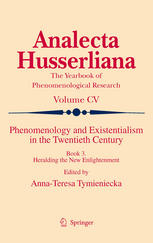

Most ebook files are in PDF format, so you can easily read them using various software such as Foxit Reader or directly on the Google Chrome browser.
Some ebook files are released by publishers in other formats such as .awz, .mobi, .epub, .fb2, etc. You may need to install specific software to read these formats on mobile/PC, such as Calibre.
Please read the tutorial at this link: https://ebookbell.com/faq
We offer FREE conversion to the popular formats you request; however, this may take some time. Therefore, right after payment, please email us, and we will try to provide the service as quickly as possible.
For some exceptional file formats or broken links (if any), please refrain from opening any disputes. Instead, email us first, and we will try to assist within a maximum of 6 hours.
EbookBell Team

5.0
70 reviewsThe great flourishing in the Twentieth Century of the amalgamated movement of Phenomenology and Existentialism, having reached its unfolding and reverberation – as we have shown in our two preceding books and continue in this one – seems to have spanned the entire gamut of their marvels.
Although the philosophical field is being still corroborated by phenomenologico-existential insights, their approaches and tendencies in a constant flux of perspectives, phenomenology as such has remained itself an open question. Its ultimate foundations, the question of "phenomenology of phenomenology", its "unconditional positioning" as the source of sense has not been solved by Husserl (see herein Verducci’s study of Husserl and Fink, infra-page).
But in this conundrum in which we find ourselves, there is gathering a wave of thought that continues regenerating philosophy. The deepest phenomenologico-existential inspirations, driven by a prompting logos, is undertaking a new critique of reason (see Verducci), apprehending the pivotal role of Imaginatio Creatrix (see Egbe), realizing Jean Wahl’s importance as an early precursor of the quest after ultimate meaning (see Kremer-Marietti) and is clarifying the Logos of the "Moral Sense" (see Cozma and Szmyd). Finding a new point of departure for all phenomenology in the ontopoiesis of life (Tymieniecka) and so establishing the sought for "first philosophy" encompassing all (see Haney), is fructifying the coalescing reformulations of issues found in the phenomenology/ontopoiesis of life. We have here a powerful ferment we may call the New Enlightenment.